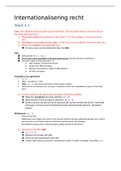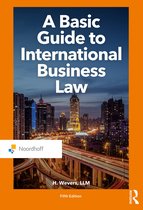Summary
Samenvatting A Basic Guide to International Business Law, ISBN: 9789001899783 Internationalisering Recht
- Course
- Institution
- Book
Samenvatting internationalisering recht, studie sportmarketing tweede studiejaar. (Let op, hierbij hoort een reader welke verkregen is vanuit school. Voor meer informatie neem even contact op)
[Show more]




